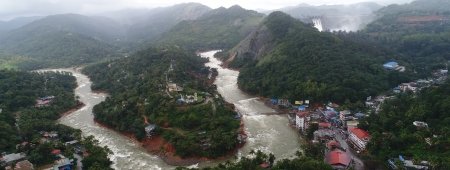What Do We Do Now? Teaching the Hard Lessons of Catastrophe
Doug Orton was somewhat bemused by a Sept. 19 Business Week article, "They Don't Teach This in B-School," about how two businesses responded decisively to chaos wreaked by Hurricane Katrina. Orton, an assistant professor in the School of Business and Economics, has been teaching just that to his graduate students for years.
Perhaps his most memorable class was a group of Air Force and Navy officers studying management in fall 2001 while working at the Pentagon. On Sept. 10, they talked in class about the so-called "cosmology episode," that confused period of time between a catastrophe and the moment the light goes on and you finally understand just what the heck is really going on. Then came 9/11.
"The next day, when one of my students, a pilot, saw the first plane fly into the World Trade Center, he asked himself, 'How could anybody be so stupid as to fly into the Trade Center?'" Orton recalled. "Then when the second plane hit, he asked, 'How could two pilots be so stupid?'"
Then he heard an explosion, which he thought was a bomb, and ran to the disaster site with a fire extinguisher. "When he was climbing in the rubble, he found he was standing on a large tire. He asked himself, 'Why is there an airplane tire in the Pentagon?'" Orton recalled.
"All 65 of my Pentagon students were having cosmology episodes the day after we talked about cosmology episodes," he said. "In times of crisis, we are much more likely to believe that systems are giving us false signals than to understand what's really going on. You have assumptions about how things should be, and when they are violated, it takes a while to catch up."
Cosmology episodes explain initial delays in responding to a crisis, but they don't justify systemic problems, which Orton believes run deep.
Orton's dissertation was a detailed study of the 1976 reorganization of the U.S. national security community, and he has been consulting for national security management clients in Washington since he finished his dissertation in 1993. "For me--and for a lot of people I work with in Washington--9/11, the invasion of Iraq and Hurricane Katrina are three bureaucratic failures of the United States that, in one way, come at a good time," he said. "They illustrate that we have 19th century leaders in a 20th century bureaucracy responding inadequately to a 21st century environment."
To address the disconnect, "we need to adopt a management style closer to that seen in Silicon Valley," Orton said. "Since 1984, business schools have been pushing people at all levels to act strategically everyday. We call this microstrategic management. Strategy isn't just for CEOs; my old professor Steven Covey has been saying this for more than 20 years."
This kind of thinking simply hasn't been valued in government, he says. "We haven't invested anywhere near the amount of money in microstrategic management training for the U.S. government as we have for U.S. businesses."
Preparing microstrategically for catastrophe means considering all the potential causes, not just al Qaida. "In the long run, Katrina could have a positive effect on national security because it shows how things can go terribly wrong," Orton said. "We had perhaps hundreds of terrorism simulations in the U.S. between 2001 and 2005, and while we were at it we probably should have been addressing natural catastrophes, too.
"The 9/11 Commission criticized the U.S. government for a failure of imagination. A month ago, we could imagine a terrorist attack, because one had already happened. But I think a lot people never thought that they'd see a category 4 or 5 hurricane in New Orleans because there'd never been one. But you would want your government to be able to imagine events that haven't happened yet--for example, that levees could be breached."
To overcome this shortfall, the civil-servant mentality in government needs to be replaced by the competitive advantage mentality prevalent in business, he said. And over time, society could demand it.
"As more Americans spend more of their workday in effective microstrategic environments, they will put more pressure on U.S. government officials to be as good at their jobs as people in American businesses are at their jobs," Orton said. "Washington is 30 years behind Silicon Valley, and it needs to catch up right now."
Michigan Technological University is an R1 public research university founded in 1885 in Houghton, and is home to nearly 7,500 students from more than 60 countries around the world. Consistently ranked among the best universities in the country for return on investment, Michigan's flagship technological university offers more than 185 undergraduate and graduate degree programs in science and technology, engineering, computing, forestry, business, health professions, humanities, mathematics, social sciences, and the arts. The rural campus is situated just miles from Lake Superior in Michigan's Upper Peninsula, offering year-round opportunities for outdoor adventure.




Comments